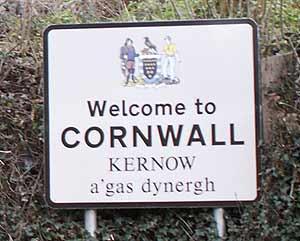
One of the positive consequences for the Manx and Cornish language movements of the recent pronouncement by UNESCO in their Atlas of Endangered Languages that these respective languages are extinct, has been the relatively high media attention that these languages have subsequently received from around the world.
Both the Cornish and Manx language officers have reported to the Celtic League that media from across the world have been in touch with them to ascertain whether these languages are in fact dead. For the most part reports that have appeared have been supportive, but occasionally facts have been misconstrued.
The editor in chief of the Atlas, Christopher Moseley, said that he would consider a new classification for Manx and Cornish, saying:
"I have always been optimistic about Cornish and Manx.
There is a groundswell of interest in them, although the number of speakers is small. Perhaps in the next edition we shall have a 'being revived' category."
Moseley added that the Manx and Cornish languages perhaps should not be classified as `extinct' "but merely sleeping".
Below is what Jenefer Lowe, Cornish Language Offficer at the Cornish Language Partnership wrote to the League following UNESCO's Atlas publication and below that is the reaction of Adrian Cain, Manx Language Officer:
Jenefer Lowe, Cornish Language Officer:
"Thank you for this email – we are grateful for the support. As with Adrian in the Isle of Man, it proved a very busy few days for me as the story provoked a lot of media attention which was mostly, I am glad to say, very positive and supportive and did give us the chance to highlight just what is being achieved in Cornwall. This week, coverage has spread further and I am about to talk to New Zealand radio about Cornish and its position!
I do note that much play was made of the lack of `mother tongue' speakers whereas in fact we do have speakers aged between 2 and 30 who were brought up with Cornish as their first language or in a fully bilingual home. They are not numerous, I grant, but they are there and bear witness to how far Cornish has come. We have a new wave of enthusaism in the primary schools, teaching in the secondary schools, accredited public exams about to be launched, moves towards early years and nursery education, bilingual street signage, web-based radio and increasing use by businesses.
I do hope that UNESCO will give some thought to recognising and supporting such languages – we are gaining ground but in terms of numbers we are still in a endangered state and, despite the European Charter which gave us recognition, very dependent on and vulnerable to the existence or otherwise of political support. I am sure I speak for my Manx colleagues as well as myself when I say that we would be very happy to supply any information required and work with UNESCO on this and any other initiative in future – the information source quoted on the site for Cornish and Manx was a 1993 publication and life and language have moved on apace since that time!"
Adrian Cain, Manx Language Officer, Isle of Man:
"The last few days have been quite busy for me as the Report has generated a good deal of coverage. It has been accompanied by a syndicated article (whose origin I'm not sure about) which has turned up on news desks the world over. See for example this from the Daily Telegraph:
All these articles comment that:
The Manx language was thought to have died out in the mid-19th century
This is as inaccurate as saying the Isle of Man is located in the Pacific Ocean. Good to see that journalists check their sources.
It was slightly ironic that the reports covering the UNESCO report on Manx came out on Friday as I had spent part of that day preparing a lesson in Manx Gaelic on how to use Macromedia Flash software for a group of 12 year olds who have their IT lesson in Manx. These children received all of their Primary education through the language. The day before we had completed our work in Manx on Spreadsheets and although Ned Maddrell may not have understood what we meant by spreadsheets and flash software he would have understood the Manx.
For more information about Manx Gaelic try the following:
www.learnmanx.com (voir le site) (voir le site)
Best wishes from the Isle of Man"
Some links to the reports can be found below:
(voir le site) (voir le site) UNESCO.5001465.j (voir le site) (voir le site) (voir le site) (voir le site) (voir le site) (voir le site)
(Article prepared for Celtic News by Rhisiart Tal-e-bot)
J B Moffatt Director of Information Celtic League
25/02/09
 The Celtic League has branches in the six Celtic Countries. It works to promote cooperation between these countries and campaigns on a broad range of political, cultural and environmental matters. It highlights human rights abuse, monitors all military activity and focuses on socio-economic issues.
TEL (UK) 01624 877918
MOBILE (UK)07624 491609
(voir le site)
The Celtic League has branches in the six Celtic Countries. It works to promote cooperation between these countries and campaigns on a broad range of political, cultural and environmental matters. It highlights human rights abuse, monitors all military activity and focuses on socio-economic issues.
TEL (UK) 01624 877918
MOBILE (UK)07624 491609
(voir le site)